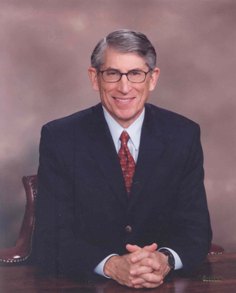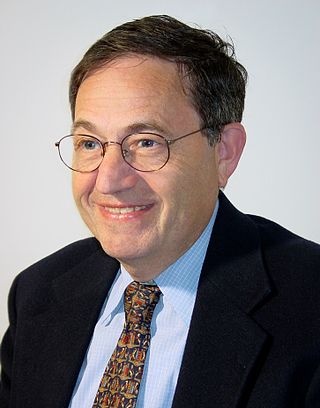
Ruben Kuzniecky is a neurologist scientist who is Vice-chair academic affairs and professor of neurology at Northwell Health specializing in the field of epilepsy, epilepsy surgery and neuro-imaging.
Dr. Kamal Badr is a Lebanese-American physician and scientist who has been Professor of Medicine and Chair of the Department of Internal Medicine at the American University of Beirut from July 2000 to late 2006. He then was named Founding Dean of the Lebanese American University’s new medical school, a position he held until September 1, 2010. He returned to the American University of Beirut in October 2010, where he is Associate Dean for Medical Education.
Orla Hardiman is an Irish consultant neurologist. She was appointed Professor of Neurology by Trinity College University of Dublin in 2014, where she heads the Academic Unit of Neurology, housed in Trinity Biomedical Sciences Institute. She is a HRB Clinician Scientist and Consultant Neurologist at the National Neuroscience Center of Ireland at Beaumont Hospital, Dublin. She leads a team of thirty researchers focusing on clinical and translational aspects of amyotrophic lateral sclerosis and related neurodegenerations. Hardiman has become a prominent advocate for neurological patients in Ireland, and for patients within the Irish health system generally. She is co-founder of the Neurological Alliance of Ireland and Doctors Alliance for Better Public Healthcare. In the past, she established the bi-annual Diaspora Meeting, a forum for Irish neurologists based overseas to present and discuss their research findings with neurologists working in Ireland.
Neuroepidemiology is a science of incidence, prevalence, risk factors, natural history and prognosis of neurological disorders, as well as of experimental neuroepidemiology, which is research based on clinical trials of effectiveness or efficacy of various interventions in neurological disorders.
Michael D. Lockshin is an American professor and medical researcher. He is known for his work as a researcher of autoimmune diseases, with focus on antiphospholipid syndrome and lupus. He is Professor Emeritus of Medicine and the Director Emeritus of the Barbara Volcker Center for Women and Rheumatic Disease at Hospital for Special Surgery. He retired from HSS on January 31st, 2023.
Burton Drayer, MD, FACR, FANN, is an American radiologist and nationally recognized authority on the use of computed tomography and magnetic resonance imaging for diagnosing neurological disorders. From 2003 to 2008, he served as president, The Mount Sinai Hospital. As of 2020, he is the Charles M. and Marilyn Newman Professor and System Chair, Radiology, for The Mount Sinai Health System and Icahn School of Medicine at Mount Sinai Hospital in New York City.

Lawrence H. Cohn, was an American-born pioneering cardiac surgeon, researcher, and medical educator. He had been on the surgical staff at Harvard Medical School since 1971 and had been a Professor of Surgery at Harvard Medical School since 1980. In 2000, he was awarded the first endowed Chair in Cardiac Surgery at Harvard Medical School.

Martin A. Samuels, MD, DSc (hon), FAAN, MACP, FRCP, FANA, was an American physician, neurologist and medical educator whose unique teaching style and contributions, accessible to a wide audience, were widely known and celebrated. He wrote and spoke on the relationships between neurology and the rest of medicine, and linked the nervous system with cardiac function, highlighting the mechanisms and prevention of neurogenic cardiac disease.
Griffith Rutherford Harsh IV is an American neurosurgeon. In 2018, he became the chair of the department of neurological surgery at UC Davis Health.
Joseph R. Berger is an American internist and neurologist who is known for his research interests in progressive multifocal leukoencephalopathy (PML), the neurological complications of HIV/AIDS, multiple sclerosis, and other inflammatory disorders of the brain. Particularly, he contributed research on why PML occurs more frequently in AIDS than in other immunosuppressive conditions.

Ferenc Andras Jolesz was a Hungarian-American physician and scientist best known for his research on image guided therapy, the process by which information derived from diagnostic imaging is used to improve the localization and targeting of diseased tissue to monitor and control treatment during surgical and interventional procedures. He pioneered the field of Magnetic Resonance Imaging-guided interventions and introduced of a variety of new medical procedures based on novel combinations of imaging and therapy delivery.

David A. Hafler is an American neurologist. He is the Edgerly Professor and chairman of the department of Neurology at the Yale School of Medicine. He is known for his work in immunity, genetics, and multiple sclerosis. In 2018 he was elected to the National Academy of Medicine.

Howard L. Weiner is an American neurologist, neuroscientist and immunologist who is also a writer and filmmaker. He performs clinical and basic research focused on multiple sclerosis (MS) and other neurologic diseases such as Alzheimer's disease and Lou Gehrig's disease (ALS). His work also focuses on autoimmune diseases such as diabetes. Weiner is the Robert L. Kroc Professor of Neurology at Harvard Medical School, director of the Brigham MS Center at the Brigham and Women's Hospital and co-director of the Ann Romney Center for Neurologic Diseases established in 2014, at the Brigham and Women's Hospital in Boston, Massachusetts.
Jonathan Rosand is an American neurologist, clinician-scientist and Professor of Neurology at Harvard Medical School. He serves as Chief of the Division of Neurocritical Care and Emergency Neurology, Medical Director of the Neurosciences Intensive Care Unit and holds the J.P. Kistler Endowed Chair in Neurology at the Massachusetts General Hospital (MGH). He is also Independent Faculty within the MGH Center for Human Genetic Research and an Associate Member of the Broad Institute of MIT and Harvard. He has previously served as Program Director for the Massachusetts General Hospital/Brigham and Women's Hospital/Harvard Medical School Fellowship Training Programs in both Neurocritical Care and Vascular Neurology. He is the founder of the International Stroke Genetics Consortium and served as its inaugural steering committee chair.
Robert Samuel Decosta Higgins MD, MSHA is an American surgeon working with heart–lung transplants. He is president, Brigham and Women's Hospital; Executive Vice President, Mass General Brigham.
Igor Koralnik is an American physician, neurologist and scientist. He is one of the first physicians to study the neurologic complications caused by the human immunodeficiency virus (HIV) and is a leading researcher in the investigation of the polyomavirus JC, which causes progressive multifocal leukoencephalopathy (PML), a disease of the central nervous system that occurs in immunosuppressed individuals.
Bryan J. Traynor is a neurologist and a senior investigator at the National Institute on Aging, and an adjunct professor at Johns Hopkins University. Dr. Traynor studies the genetics of human neurological conditions such as amyotrophic lateral sclerosis (ALS) and frontotemporal dementia (FTD). He led the international consortium that identified pathogenic repeat expansions in the C9orf72 gene as a common cause of ALS and FTD. Dr. Traynor also led efforts that identified other Mendelian genes responsible for familial ALS and dementia, including VCP, MATR3, KIF5A, HTT, and SPTLC1.
Merit Cudkowicz is an American neurologist and neuroscientist who studies amyotrophic lateral sclerosis (ALS). Cudkowicz is Julieanne Dorn Professor of Neurology at Harvard Medical School, director of the ALS clinic and the Neurological Clinical Research Institute at Massachusetts General Hospital (MGH), and chair of the Department of Neurology at MGH. Cudkowicz has led several large-scale collaborations and clinical trials to test novel treatments for ALS and as of 2020, researching ways to detect early biomarkers of ALS to improve diagnosis.
Mukesh K. Jain is an American physician-scientist specializing in cardiovascular medicine. Since March 2022 he has served as Dean of Biological Sciences at Brown University and Dean of Medicine at the Warren Alpert Medical School. Jain previously served as Chief Scientific Officer at University Hospitals Health System and Vice-Dean for Medical Sciences at Case Western Reserve University.
Brenda Banwell is Chief of the Division of Neurology and Co-Director of the Neuroscience Center, and Professor of Neurology at Children's Hospital of Philadelphia and holder of the Grace R. Loeb Endowed Chair in Neurosciences. She also holds the title of Professor of Pediatrics and Neurology at the Perelman School of Medicine at the University of Pennsylvania.






